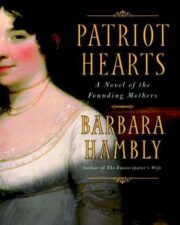Bonaparte. Dolley identified the topic of conversation at once and with an inner sigh. Since the Directorate of France had begun sending its troops into Italy, very little else was being talked about.
And the next instant, identified the voice.
“Sophie!”
The woman in gray turned, her cool sardonic smile melting into an expression of genuine pleasure. “Dearest!” The two women clasped hands, then, impulsively, embraced. “My mother always vowed you should marry a planter! She would be pleased to see herself proved right.”
Dolley’s eye flickered over the exquisitely fashionable somberness of her friend’s dress, and she bit back her query, And how is thy dear mother…? Sophie seemed to read both her unspoken words and her instantaneous afterthought, and added, more quietly, “She would have been pleased to see you looking so well, too, Dolley. She always said you were the best of my friends.”
That time, the past tense was unmistakable.
“I’m sorry.”
Sophie shook her head, though her features tightened momentarily with some unsaid and bitter reflection. “In many ways I miss her more than I miss Mr. Hallam—who was a good husband, as husbands go….” She waved away his specter dismissively, and smiled her sidelong smile. “I am a mere dressmaker these days, but as we live in a democracy now, both Colonel Burr and Lady Washington assured me there would be no objection to my accompanying him here.”
“Mrs. Hallam? Art thou the Mrs. Hallam whose needlework Lady Washington doth praise so highly? She hath said she knew thee as a child—”
“And so she did. My father consulted with her on her own health and her daughter Patcy’s, when she’d bring her into Williamsburg. I owe Lady Washington a good deal.”
And Dolley thought, as Aaron Burr turned aside to bow over Maria Morris’s hand, that the diminutive Senator gave Sophie a curious, speculative look.
After years of wondering, Dolley had learned almost by chance from Tom Jefferson that her friend had made it to Cornwallis’s camp at Yorktown, and that she had done nursing for a Yorktown doctor in the final year of the War. Later, Patsy Jefferson Randolph had spoken of meeting Sophie again in Paris. Dolley learned that Sophie and her mother had taken ship with the departing British troops in 1783, and that her mother had died on the voyage. Hence, Sophie remarked with brittle lightness, her stint as a paid companion to an Englishwoman in Paris when all Hell was about to break loose. But how she had gotten out of Paris, who Mr. Hallam had been, and how and why Sophie had returned to Philadelphia to take up life as a seamstress, she would not say.
Because of her friendship with Martha Washington, and because of her undeniable good breeding and wit as well as her skill at cutting a gown, Sophie Hallam rapidly made herself a fixture in Philadelphia society. She knew everyone and everything, and was welcome in both Federalist and Republican circles. For she had early issued her own Proclamation of Neutrality, she claimed, in imitation of the President’s: listening to any gossip and never passing a word of it along.
Which was odd, Dolley thought, in a woman whom she recalled as being sharply outspoken in her loyalty, long ago, to the Crown.
Certainly Sophie’s letters had enlivened the next few years.


"Patriot Hearts: A Novel of the Founding Mothers" отзывы
Отзывы читателей о книге "Patriot Hearts: A Novel of the Founding Mothers". Читайте комментарии и мнения людей о произведении.
Понравилась книга? Поделитесь впечатлениями - оставьте Ваш отзыв и расскажите о книге "Patriot Hearts: A Novel of the Founding Mothers" друзьям в соцсетях.